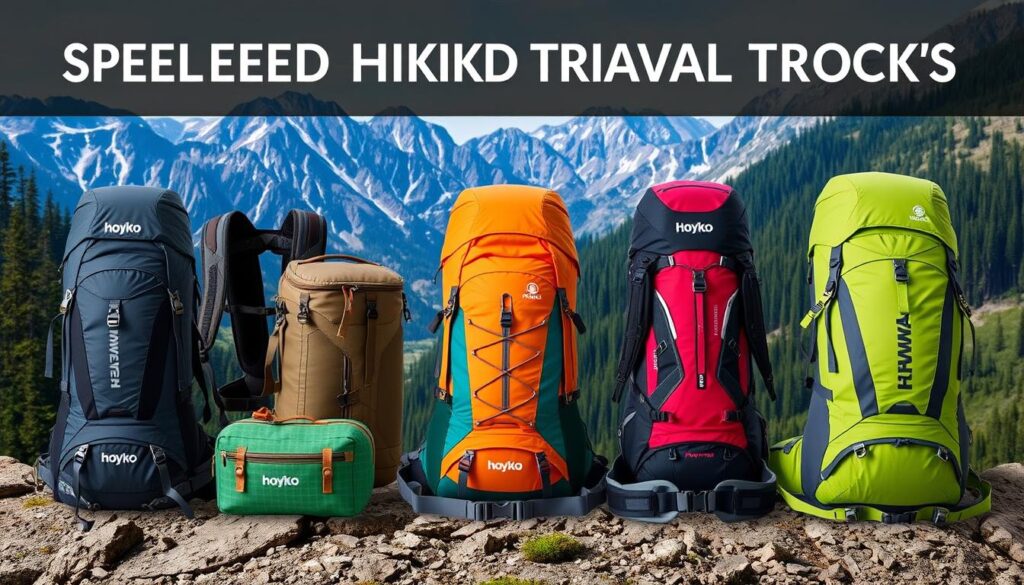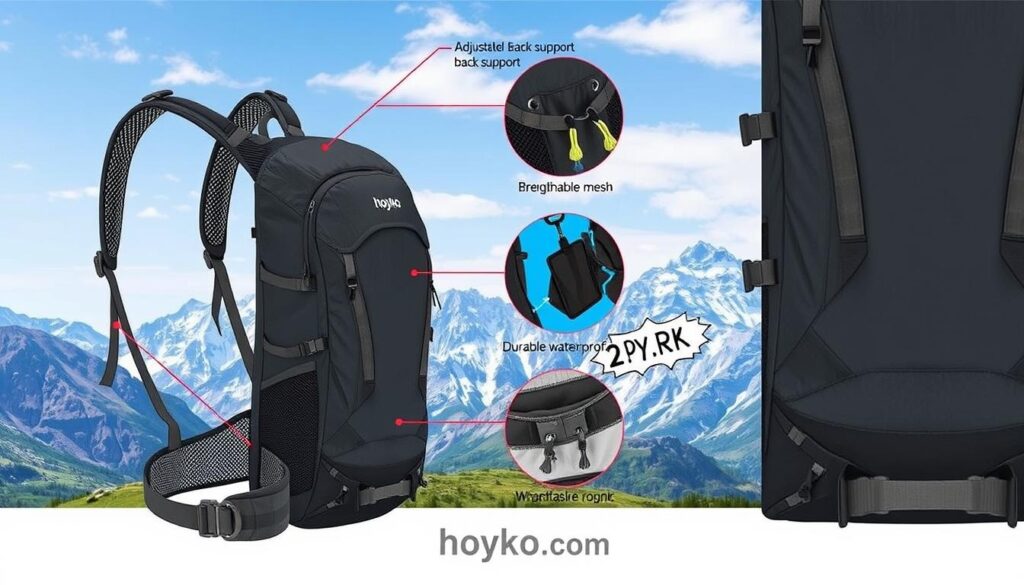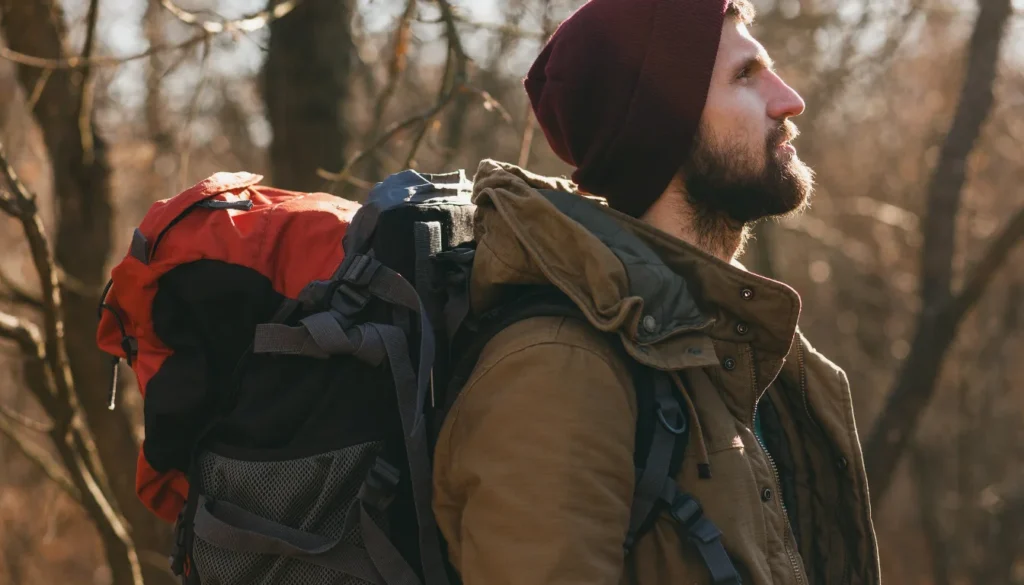Reaching Mount Rainier’s summit was unforgettable. My hiking travel backpack was a silent companion through every step. It carried my gear, dreams, and determination.
The right backpack can make or break outdoor experiences. A quality hiking travel backpack is essential for turning treks into adventures.

Investing in the best hiking travel backpack is crucial for any trip. It’s more than carrying stuff; it’s about having a reliable partner. Your backpack should support you through diverse terrains and weather conditions.
Let’s explore features that can transform your adventures. We’ll find the perfect hiking travel backpack to elevate your outdoor journeys.
Why You Need a Specialized Hiking Travel Backpack
A travel hiking backpack is crucial for outdoor adventures. These bags offer unique advantages over regular backpacks. They’re the top choice for serious trekkers exploring nature.

Versatility for Different Terrains
Hiking travel backpacks handle various landscapes with ease. They have adjustable straps and weight distribution systems. These features adapt to steep inclines, rocky paths, or flat trails.
This versatility ensures comfort and stability across diverse terrains. You’ll feel secure no matter where you hike.
Comfort for Long Treks
Long hikes need gear that won’t tire you out. Travel hiking backpacks have padded hip belts and ventilated back panels. They also feature ergonomic shoulder straps for added comfort.
These elements spread weight evenly and reduce fatigue. They also prevent chafing during extended journeys.
Organization Features for Travel
The best travel hiking backpack has smart storage solutions. Multiple compartments keep gear organized and easy to reach. Side pockets hold water bottles securely.
Top lids store quick-grab items for convenience. Internal dividers separate clothes and equipment neatly.
- External attachment points for trekking poles or sleeping bags
- Hydration system compatibility
- Hidden pockets for valuables
A specialized hiking travel backpack improves your outdoor experience. It combines durability for rugged adventures with travel convenience. This makes it essential for any hiking trip.
Key Features to Look for in a Hiking Travel Backpack
A great hiking travel backpack combines comfort, durability, and functionality. These features are crucial for a top-notch pack. Let’s explore what makes a backpack stand out.

Weight distribution is vital in a hiking backpack. Look for packs with good suspension systems. These spread the load evenly across your shoulders and hips.
Adjustability ensures a comfortable fit for different body types. Seek backpacks with customizable torso lengths and hip belts. This helps create a snug fit for your body.
- Multiple access points
- Durable materials
- Ample storage compartments
- Hydration compatibility
Multiple entry points are valuable in a backpack. Top-loading designs work well for packing gear. Side zippers offer quick access to your items.
Durability is key for long-lasting use. Choose backpacks made from ripstop nylon or high-denier polyester. These materials can withstand tough conditions.
Organization features help keep your gear tidy. Look for various compartments and pockets. A dedicated sleeping bag section is also useful.
Hydration compatibility is important for long hikes. The best backpacks can hold a water reservoir. This keeps you hydrated on your adventures.
Top Brands Offering the Best Hiking Travel Backpack
Several brands excel in creating high-quality hiking and travel backpacks. Four top contenders stand out for their durability and functionality. Let’s explore these outstanding options for your next adventure.
Osprey
Osprey leads with innovative designs like the Farpoint 55. This versatile backpack features a detachable daypack for short trips. Its main compartment offers ample space for gear.
The suspension system ensures comfort on long treks. Osprey’s attention to detail makes it a top choice for travelers.
Deuter
Deuter specializes in ergonomic backpacks, like the Aircontact Lite 65+10. This model is perfect for extended trips. It boasts an adjustable back system and breathable padding.
The expandable collar adds extra space when needed. Deuter’s focus on comfort makes it ideal for long hikes.
Gregory
Gregory prioritizes comfort and organization in their backpacks. The Baltoro 75 features a responsive A3 suspension system. It adapts to your body, evenly distributing weight.
Multiple access points and pockets keep gear organized. Easy accessibility is a key feature of Gregory backpacks.
The North Face
The North Face combines durability and style in their backpacks. The Terra 65 offers rugged construction and comfort features. Its Optifit suspension system allows for custom fitting.
A dedicated sleeping bag compartment adds convenience for overnight trips. The North Face backpacks are built to last.
Each brand offers unique strengths in their backpacks. Consider your specific needs when choosing your ideal travel hiking backpack.
Size Matters: Choosing the Right Capacity
The perfect backpack size can make or break your hiking adventure. The right capacity depends on trip length, gear needs, and travel style. Let’s explore how to choose the ideal size for your next expedition.
Weekend warriors typically need a 30-50 liter travel hiking backpack. It’s compact for quick getaways yet roomy enough for essentials. For week-long treks, opt for a 50-70 liter pack.
This size accommodates extra clothing, food, and gear without becoming cumbersome. Extended adventures require larger capacities, like 70-85 liter hiking travel backpacks.
These packs offer ample space for all necessities. They can hold camping equipment and supplies for various weather conditions.
| Trip Duration | Recommended Capacity | Ideal For |
|---|---|---|
| 1-3 days | 30-50 liters | Weekend trips, minimal gear |
| 4-7 days | 50-70 liters | Week-long hikes, moderate gear |
| 7+ days | 70-85 liters | Extended treks, full gear load |
Remember, bigger isn’t always better. Oversized packs can throw off your balance and encourage overpacking. A too-small backpack might leave you unprepared.
Find the sweet spot between comfort and capacity. This balance will ensure the best hiking experience possible.
Durability and Weather Resistance Considerations
Durability and weather resistance are vital for hiking and travel backpacks. A good backpack must protect your gear in various conditions. It should withstand harsh environments and keep your belongings safe.
Materials to Look For
Top-notch hiking travel backpacks use sturdy materials like ripstop nylon or Cordura fabric. These materials resist tears and abrasions effectively. They ensure your backpack endures many adventures without falling apart.
Waterproofing Options
Keep your gear dry with a backpack that has built-in rain covers. Look for water-resistant coatings on the fabric. Some backpacks feature waterproof zippers and sealed seams for extra protection.
Reinforced Stress Points
Quality backpacks have reinforced areas at key stress points. This includes the bottom, shoulder straps, and hip belt attachments. These reinforcements prevent wear and tear over time.
| Feature | Benefit |
|---|---|
| Ripstop Nylon | Tear-resistant and lightweight |
| Built-in Rain Cover | Protects against sudden downpours |
| Reinforced Bottom | Prevents wear from frequent setting down |
Choose a backpack with these features for your outdoor adventures. It will keep your gear safe and dry. Your backpack will stand up to challenges and last longer.
Comfort Features: Straps, Padding, and Support Systems
Comfort is crucial for a great travel hiking backpack. Well-designed straps, padding, and support systems can transform your hiking experience. Padded shoulder straps distribute weight evenly, reducing upper body strain.
Hip belts transfer weight from shoulders to hips, easing the load during hikes. Load lifters pull the pack closer, improving balance and reducing fatigue. Adjustable straps help customize the fit to your frame.
Ventilation is vital for comfort on the trail. Many backpacks now include mesh back panels for better airflow. These create air channels between your back and the pack, keeping you cool.
The best backpack should feel like an extension of your body. Try on several options and adjust the features. A comfortable pack lets you focus on the beauty around you.

